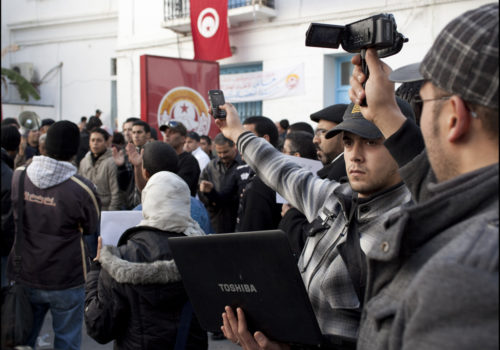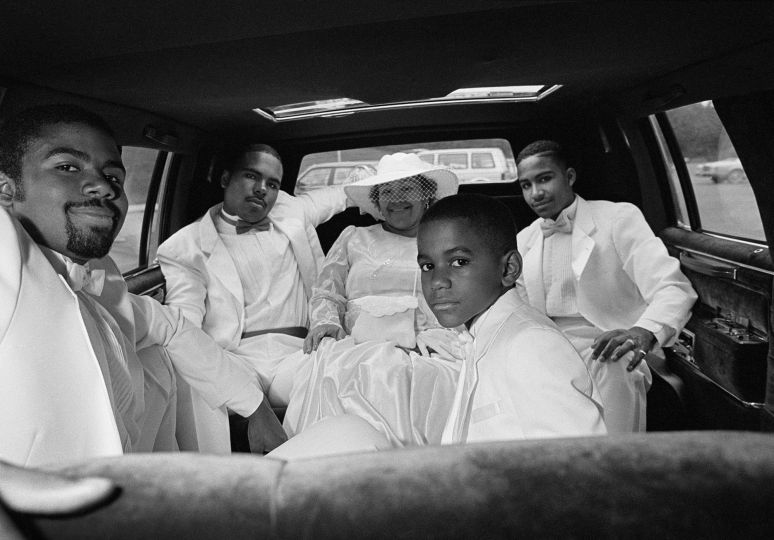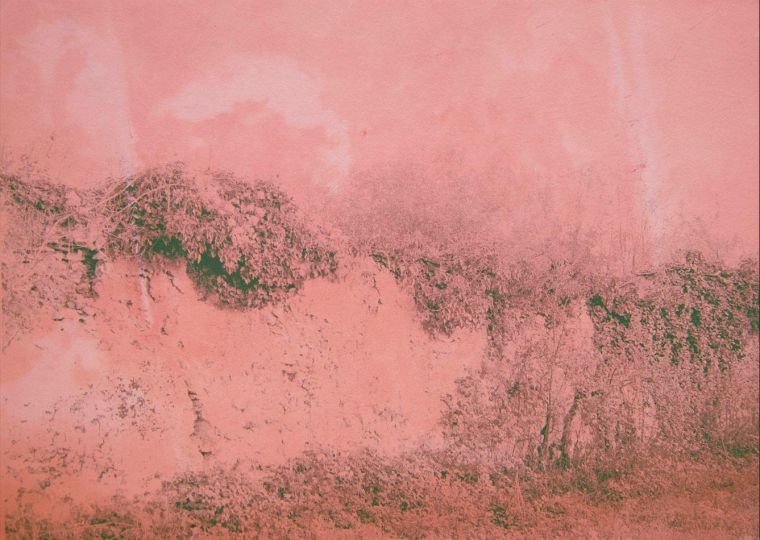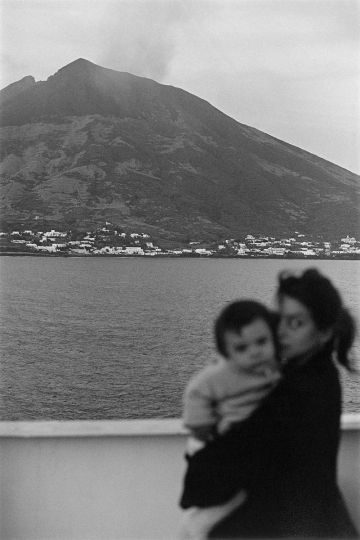Tunisie 2.0
Johann Rousselot / Maison de photographes – Signatures
December 2010. Protests take hold on a long-term basis in Tunisia and the dictatorial regime of President Ben Ali, in place for twenty-three years, is shaking under the pressure from the streets. The revolution is covered by the news photographers and the agencies at the scene. The photos of the demonstrations are on the front pages of the daily papers and magazines.
Johann Rousselot, like many of his colleagues, has a feeling that something is going on. “I shuddered while reading the paper”, he tells us. Still in Paris on 14th January 2011, the day Ben Ali departed, Johann is gathering information and discovers on the ReadWriteWeb blog the decisive role of the Web and the social networks in the Tunisian revolt. He realises then that something important is happening and decides to leave and meet those involved in this new kind of movement. “I wanted to try and understand how we can make a revolution on the Web”, he explains.
He makes two other trips, between February and May 2011, for several commissions and to continue his personal work. The portraits published here were taken during his first trip. Alongside his photographic work, Johann Rousselot decides to make some sound and video recordings so as to create a multimedia content that will allow him to go even further. As he himself admits: “It’s difficult to make a story with pictures with a subject like this. To try and understand how cyberactivism works, the technical questions, how to avoid censorship… photography, it’s soon limited”. This multimedia content is available on Johann Rousselot’s website (johann-rousselot.com), on the site of the ‘Maison de photographes’, on that of Signatures which diffuses his work (www.signatures-photographies.com) and on www.zmala.net.
Amin
“Amin, the first time I saw him was in this Facebook tent, Place de la Casbah in Tunis, two days before the evacuation, on 26th January.” This tent is shared between bloggers and magistrates who are very present in the protest movement. Amin and other cyberactivists make the most of the connection to set up with them. Always in action, they continually feed a Facebook page to pass on information, photos, videos… “They were in this compulsively. In fact, they were researching and sharing, they needed to post very quickly, like a race in just a few clicks”, explains Johann.
“Although very active, Amin is difficult to figure out”, with motives that were less obvious than the other bloggers. “I wonder if, for Amin and his friends, this wasn’t just an easy way of being able to live the present moment to the full”, adds Johann.
After studying computer science, this young 23 year old mathematician, son of a dismissed civil servant, is the co-administrator of a Facebook page on the revolution. Amin is emblematic of this generation of young graduates who cannot manage to find their place in the Tunisian society moulded by Ben Ali.
Here he is with a friend in front of the headquarters of the General Union of Tunisian Workers (UGTT). Both of them are recording and diffusing almost instantaneously the course of a demonstration in Tunis, on 29th January 2011.
Olfa Riahi
“I was to meet with Olfa in front of the theatre on Avenue Bourguiba, it was a commission for a German magazine, for a portrait”.
Olfa arrives late, the light is fading. “We were getting off to a bad start”, explains Johann. With all her senses on alert, the young woman asks the photographer to wait a few minutes more, and then rushes into the demonstration. There she films, records, talks to the radio, runs through the demonstration from from one end to the other and opens her computer to post the information she has gathered. There is one half-hour sequence during which Johann holds on to her and takes photos. Without any journalistic training, she passionately steps out into the field of information. She produces content that she puts on-line on the spot. It all happens very quickly.
Olfa Riahi, 28 years old, appears as a “true pasionaria of the Tunisian revolution”, according to Johann. Further to her studies in international marketing, she creates two companies for subtitling and cultural mediation, and then in September 2010 she becomes a chronicler and presenter at Express FM. She takes risks and her editors call her to order and tell her to calm down.
Known in her job to be hot-headed, she nonetheless gains real credibility in the eyes of the Tunisians. “She did the work that the journalists didn’t do, without claiming to be a journalist”, explains the photographer. Olfa checks the information, confirms her sources: her work is recognised. She juggles with her work for Express FM and the information that arrives on her Facebook wall via her computer that is permanently on-line.
Yassine Ayari
“I’m not a journalist”, stresses Yassine. He just wants to play his role as a committed citizen. He follows demonstrations, gathers witness accounts and tracks down new voices. Johann follows him one whole day.
With his camera continually on, Yassine devotes himself to filming and copying his videos via TwitVid, a host platform. What matters is that the information circulates and is shared, with the aim of giving a voice to those without a voice. ‘Voice to voiceless’ is the term he uses.
Aware that words win back rights, Yassine goes with the flow of the movement and gathers the words and demands of the demonstrators. Having left to interview a policeman who was prepared to reply anonymously (this was not followed through), he meets factory workers on strike and decides to record their accounts. They push each other to speak in front of the camera: social, individual demands… They have an immense desire to speak, to be listened to, to be heard.
Yassine, a 29 year old computer scientist, fleed to Belgium. From May 2010 onwards, he organises (with two friends, Aziz Amami et Slim Amamou) an anti-censorship demonstration which was to lead no doubt to their arrest in January 2011. Faced with the repression he returns to Belgium to continue feeding his blog. After Ben Ali’s fall, he returns to Tunisia, where he travels to every corner of the country in order to gather stories and witness accounts. His ambition is to work in politics and would like to set up a free newspaper like 20 minutes (a free daily French publication).
Chiheb ben Nasr
“I met Chiheb in Tunis”, explains Johann. Chiheb is a merchant in household appliances, living in Douz, in the south of the country. He came here to be with his friends in the blogosphere.
Father of three children and in his forties, he has a different profile to that of the cyber-dissident. Living on the edge of the desert, Chiheb for a long time presented a blog where he produced columns on culture and local news. Twice he was censored; he quickly went on to Facebook and Twitter. With his telephone at hand at all times, “he twitters continually”, states Johann. Every day he follows the episodes of the revolution on the social networks, which he chooses to publish and share in turn. In his home town Douz, Chiheb has logistic support from a friend and computer analyst, who is able to repair any computer and obtain all software available on the Web.
With this fourth portrait, Johann Rousselot presents us with an atypical character, a real supplier of information who contributes in his own way to the Tunisian revolution. He also shows us that the movement plunges its roots into the whole country and is not limited to just an urban phenomenon. Moreover, the thorough work of the bloggers like Chiheb, prove that there the revolution also has a history and that it was not as spontaneous as we may have thought.
Famous Anonymous
The social networks actively participated in the ‘Jasmine Revolution’ canalising and catalysing the anger of the people. This movement was made possible by the commitment of those whose digital identity was asserted – to whom the portraits published here pay tribute -, but also by anonymous people, the Anonymous, who enabled the networks to function. This community, founded in 2003, ardently defends freedom of expression by pushing egos aside and by proclaiming a collective awareness of the Internet.
After targeted attacks on the sites of scientology or multinationals, the Anonymous actively participated in the WikiLeaks adventure. In 2010, they contributed to the fight against the censorship of the Internet in several countries, particularly in Tunisia. In a way, “Tunisia is only one piece of the puzzle that is in the process of being completed”, concludes Johann Rousselot.
The joining together of secret contacts makes up a force that the Ben Ali regime greatly misjudged; a force that worries many governments, a force where the power of the collective fully expresses itself.
Éric Karsenty et Fabien Vernois
















